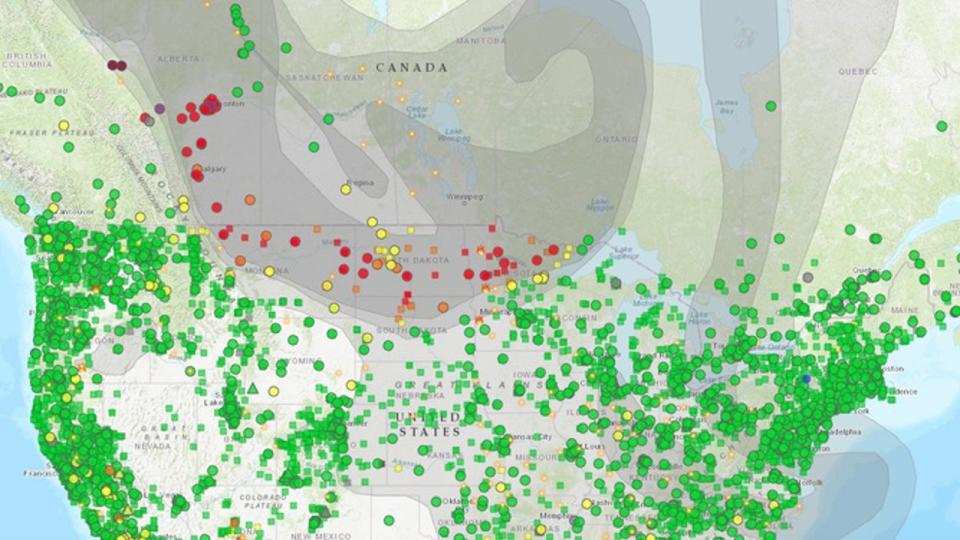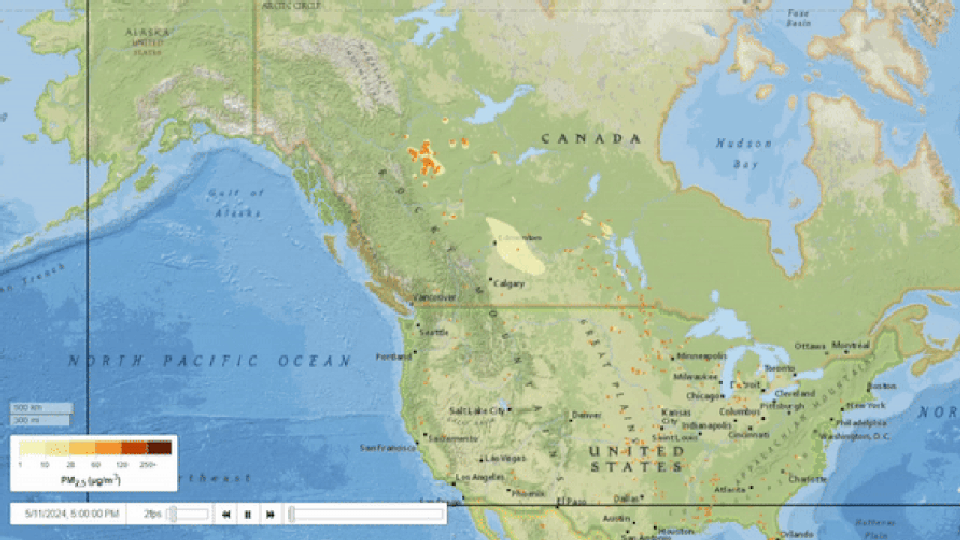NYC air quality today: Will Canadian wildfire smoke reach the East Coast?

NEW YORK - Could smoke from wildfires raging in Canada once again make its way to NYC?
JUMP TO: NYC real-time air quality index map
Wildfires in British Columbia and Alberta sent the haze over parts of Montana, the Dakotas, Minnesota and Wisconsin on Sunday, lingering into Monday morning.
Smoke from Canadian wildfires has been mixing down to the surface, as seen by this @MnDOT webcam near Cook, MN. Expect this near-surface smoke to continue to move southeast across the Northland today. An Air Quality Alert is in effect for NE MN until 8 AM CDT Monday. #mnwx #wiwx pic.twitter.com/hLwkeM5cjo
— NWS Duluth (@NWSduluth) May 12, 2024
At least some smoke could drift as far south as Iowa and Chicago, leaving skies looking milky by late Tuesday or early Wednesday, said Rafal Ogorek, a meteorologist in the National Weather Service’s Chicago office.
Nearly 90 fires are currently burning in Canada, according to the Canadian government's National Wildland Fire Situation report. Smoke, however, likely won't enter NYC airspace over the next couple of weeks, according to FOX Weather.

"If there are any effects felt over the next couple of weeks, the FOX Forecast Center said they’ll likely be confined to the U.S.-Canada border region and not venture far to the south," FOX Weather reported.
NYC air quality index map
This map from AirNow.gov shows the current air quality in the New York City area. Click here if you're having trouble viewing the embedded map.
"It does not look like significant smoke is coming this way," FOX 5 NY's Mike Woods said. "In fact, it looks like it's barely making it into upstate New York."
NYC 2024 wildfire smoke forecast
Last June, winds blew smoke from unchecked Canadian wildfires into the region, which led the Department of Environmental Conservation to issue an Air Quality Health Advisory for all five boroughs.
According to IQAir.com, New York City had the world's worst air quality of any major city in the world back on June 7, with an AQI rating over 350, more than twice as high as Dubai.
"It doesn't look like the same scenario as we had last summer," Woods said.
So, what's the outlook for 2024? Here's what to know:
Canada wildfires 2024 map
The combination of warm temperatures and an ongoing drought have helped fuel several fires in western Canada, which has has triggered thousands to leave their homes.
One of the largest fires burning in the province of British Columbia is called the Parker Lake Wildfire. As of Sunday, the blaze had burned more than 6,100 acres, and firefighters said it was continuing to show extreme behavior due to dry brush and winds.

Wildfires were also reported in neighboring Alberta, where thick smoke and poor air quality were experienced in large parts of the province. An evacuation alert was issued for Fort McMurray in Alberta as crews responded to what they described as an "out-of-control wildfire" southwest of town that had burned more than 13,500 acres as of Sunday.
"Conditions in many parts of B.C., and especially in the Prince George Fire Centre (PGFC), are unseasonably dry and more typical of those observed in the late summer. As a result, fuels are more susceptible to ignition and wildfires can spread more quickly," the British Columbia Wildfire Service said.
Additionally, authorities were monitoring fires that have rekindled since the historic firestorm of 2023, which burned more than 45 million acres.
Canada’s wildfire season typically begins in May and runs through September, but most blazes are reported in June and July.
How does wildfire smoke affect your health?
Wildfire smoke is a complex mixture of gases, particles and water vapor that contains multiple pollutants that can get into the lungs and bloodstream.
There is no evidence of a safe level of exposure to some of the pollutants, meaning that smoke can impact your health even at very low levels.
Inhaling smoke from wildfires can cause headaches, sore and watery eyes, nose, throat, and sinus irritation, chest pains, heart palpitations and more.
Who should be careful?
Exposure to elevated fine particle pollution levels can affect the lungs and heart.
The air quality alerts caution "sensitive groups," a big category that includes children, older adults, and people with lung diseases, such as asthma and chronic obstructive pulmonary disease.
Kids, who often are encouraged to go out and play, "are more susceptible to smoke for a number of reasons," said Laura Kate Bender, the lung association's National Assistant Vice President, healthy air. "Their lungs are still developing, they breathe in more air per unit of body weight."
No one is immune.
FOX Weather contributed to this report.

